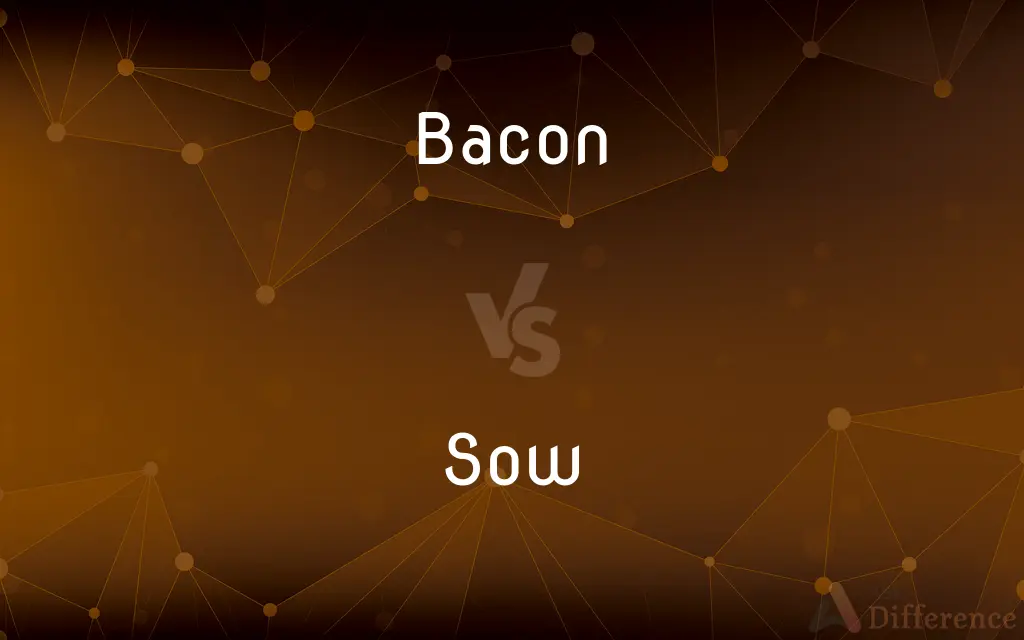Bacon vs. Sow — What's the Difference?

Difference Between Bacon and Sow
ADVERTISEMENT
Compare with Definitions
Bacon
Bacon is a type of salt-cured pork made from various cuts, typically from the pork belly or from the less fatty back cuts. It is eaten on its own, as a side dish (particularly in breakfasts), or used as a minor ingredient to flavour dishes (e.g., the club sandwich).
Sow
To scatter (seed) over the ground for growing.
Bacon
The salted and smoked meat from the back and sides of a pig.
Sow
To scatter seed over (land, for example).
Bacon
Cured meat from the sides, belly, or back of a pig.
ADVERTISEMENT
Sow
To strew something around or over (an area); distribute something over
"The yard was sown with cement sculpture" (Ashley Warlick).
Bacon
Thin slices of the above in long strips.
Sow
To propagate; disseminate
Sow rumors.
Bacon
The police or spies.
Run! It's the bacon!
Sow
To scatter seed for growing.
Bacon
Road rash.
Sow
An adult female pig, especially one that has had at least one litter.
Bacon
A saucisse.
Sow
The adult female of several other animals, such as the bear.
Bacon
The back and sides of a pig salted and smoked; formerly, the flesh of a pig salted or fresh.
Sow
A channel that conducts molten iron to the molds in a pig bed.
Bacon
Roger Bacon. A celebrated English philosopher of the thirteenth century. Born at or near Ilchester, Somersetshire, about 1214: died probably at Oxford in 1294. He is credited with a recognition of the importance of experiment in answering questions about the natural world, recognized the potential importance of gunpowder and explosives generally, and wrote comments about several of the physical sciences that anticipated facts proven by experiment only much later.
The Franciscan monk, Roger Bacon (c. 1214 - 1294) was an important transitional figure in chemistry as he was trained in the alchemical tradition, but introduced many of the modern concepts of experimental science. Bacon believed that experiment was necessary to support theory, but for him the theory as presented in the Bible was true and the experiment only underlined that truth. One of Bacon's lasting contributions was his references to gunpowder, bringing this discovery to the general attention of literate Europeans. Gunpowder had been known for centuries in China, being used for fireworks and incendiary grenades. Gunpowder is a simple mixture of charcoal, sulfur, and potassium nitrate (known generally as saltpeter). Saltpeter is a major component of guano (bird droppings) and may be recovered from privies where it will crystallize. By 1324, Europeans had discovered the art of using gunpowder to fire a projectile, marking the end of the period of castles and knights in armor.
Roger Bacon was Born at or near Ilchester, Somersetshire, about 1214: died probably at Oxford in 1294. He was educated at Oxford and Paris (whence he appears to have returned to England about 1250), and joined the Franciscan order. In 1257 he was sent by his superiors to Paris where he was kept in close confinement for several years. About 1265 he was invited by Pope Clement IV. to write a general treatise on the sciences, in answer to which he composed his chief work, the "Opus Majus." He was in England in 1268. In 1278 his writings were condemned as heretical by a council of his order, in consequence of which he was again placed in confinement. He was at liberty in 1292. Besides the "Opus Majus," his most notable works are "Opus Minus," "Opus Tertium," and "Compendium Philosophiae." See Siebert, "Roger Bacon," 1861; Held, "Roger Bacon's Praktische Philosophie," 1881; and L. Schneider, "Roger Bacon," 1873.
Dr. Whewell says that Roger Bacon's Opus Majus is "the encyclopedia and Novam Organon of the Thirteenth Century, a work equally wonderful with regard to its general scheme and to the special treatises with which the outlines of the plans are filled up.
Sow
The mass of metal solidified in such a channel or mold.
Bacon
Francis Bacon. A celebrated English philosopher, jurist, and statesman, son of Sir Nicholas Bacon. Born at York House, London, Jan. 22, 1561: died at Highgate, April 9, 1626, created Baron Verulam July 12, 1618, and Viscount St. Albans Jan. 27, 1621: commonly, but incorrectly, called Lord Bacon. He studied at Trinity College, Cambridge, April, 1573, to March, 1575, and at Gray's Inn 1575; became attached to the embassy of Sir Amias Paulet in France in 1576; was admitted to the bar in 1582; entered Parliament in 1584; was knighted in 1603; became solicitor-general in 1607, and attorney-general in 1613; was made a privy councilor in 1616, lord keeper in 1617, and lord chancellor in 1618; and was tried in 1621 for bribery, condemned, fined, and removed from office. A notable incident of his career was his connection with the Earl of Essex, which began in July, 1591, remained an intimate friendship until the fall of Essex (1600-01), and ended in Bacon's active efforts to secure the conviction of the earl for treason. (See Essex.) His great fame rests upon his services as a reformer of the methods of scientific investigation; and though his relation to the progress of knowledge has been exaggerated and misunderstood, his reputation as one of the chief founders of modern inductive science is well grounded. His chief works are the "Advancement of Learning," published in English as "The Two Books of Francis Bacon of the Proficience and Advancement of Learning Divine and Human," in 1605; the "Novum organum sive indicia vera de interpretatione naturae," published in Latin, 1620, as a "second part" of the (incomplete) "Instauratio magna"; the "De dignitate et augmentis scientiarum," published in Latin in 1623; "Historia Ventorum" (1622), "Historia Vitae et Mortis" (1623), "Historia Densi et Rari" (posthumously, 1658), "Sylva Sylvarum" (posthumously, 1627), "New Atlantis," "Essays" (1597, 1612, 1625), "De Sapientia Veterum" (1609), "Apothegms New and Old," "History of Henry VII." (1622). Works edited by Ellis, Spedding, and Heath (7 vols. 1857); Life by Spedding (7 vols. 1861, 2 vols. 1878). See Shakspere.
Sow
A female pig.
Bacon
Back and sides of a hog salted and dried or smoked; usually sliced thin and fried
Sow
A female bear, she-bear.
Bacon
English scientist and Franciscan monk who stressed the importance of experimentation; first showed that air is required for combustion and first used lenses to correct vision (1220-1292)
Sow
A female guinea pig.
Bacon
English statesman and philosopher; precursor of British empiricism; advocated inductive reasoning (1561-1626)
Sow
A channel that conducts molten metal to molds.
Sow
A mass of metal solidified in a mold.
Sow
A contemptible, often fat woman.
Sow
A sowbug.
Sow
(military) A kind of covered shed, formerly used by besiegers in filling up and passing the ditch of a besieged place, sapping and mining the wall, etc.
Sow
(ambitransitive) To scatter, disperse, or plant (seeds).
When I had sown the field, the day's work was over.
As you sow, so shall you reap.
Sow
(figurative) To spread abroad; to propagate.
Sow
(figurative) To scatter over; to besprinkle.
Sow
Obsolete spelling of sew
Sow
To sew. See Sew.
Sow
To scatter, as seed, upon the earth; to plant by strewing; as, to sow wheat. Also used figuratively: To spread abroad; to propagate.
A sower went forth to sow; and when he sowed, some seeds fell by the wayside.
And sow dissension in the hearts of brothers.
Sow
To scatter seed upon, in, or over; to supply or stock, as land, with seeds. Also used figuratively: To scatter over; to besprinkle.
The intellectual faculty is a goodly field, . . . and it is the worst husbandry in the world to sow it with trifles.
[He] sowed with stars the heaven.
Now morn . . . sowed the earth with orient pearl.
Sow
To scatter seed for growth and the production of a crop; - literally or figuratively.
They that sow in tears shall reap in joi.
Sow
The female of swine, or of the hog kind.
Sow
A sow bug.
Sow
A channel or runner which receives the rows of molds in the pig bed.
Sow
A kind of covered shed, formerly used by besiegers in filling up and passing the ditch of a besieged place, sapping and mining the wall, or the like.
Sow
An adult female hog
Sow
Place (seeds) in or on the ground for future growth;
She sowed sunflower seeds
Sow
Introduce into an environment;
Sow suspicion or beliefs
Sow
Place seeds in or on (the ground);
Sow the ground with sunflower seeds
Share Your Discovery

Previous Comparison
Minaret vs. Spire
Next Comparison
Beauty vs. Aesthetics













































